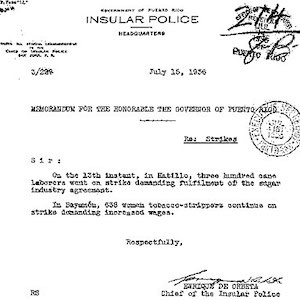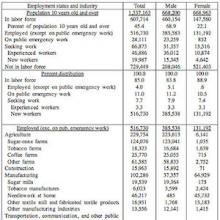Women
Long Teaching Module: Women and Politics in Southeast Asia, 1900-2000
This module examines women’s attempts to negotiate political spaces in the realms of official and unofficial power in Southeast Asia in the 20th century.

Official Document, Police Letter
This letter documents the government's continued concern about women striking, as the Chief of Police for the Island reports new labor strike figures to the Governor. In this case, 638 women working as tobacco strippers went on strike.
Women’s Reflections on Work and Gender Relations under Socialism
In this collection of oral histories from Romania, subjects “R,” “I,” “M,” “E,” and “N” talk about their experiences of work during the socialist period.

Official Document, Women's Employment
The National Recovery Administration (NRA) was a New Deal response to the Depression to stabilize and energize the economy of the United States. One function of the NRA was to set industry standards for products, production methods, and wages. The codes developed for U.S.
Women’s Reflections on Marital Relations under Socialism
In this collection of oral histories, “V” and “L” reflect on marital relations under socialism. According to “V,” men’s upbringing in the family played a fundamental role in shaping their attitudes toward wives.

Photograph, Needleworker
This photograph illustrates a home needleworker in the streets of San Juan around 1903. At this time, and afterwards, almost all needlework was done at home. Working at home allowed women to negotiate their own contracts with agents, who commissioned certain types and styles of work.
Women’s Reflections on Motherhood and Reproduction under Socialism
During a set of oral history interviews conducted in Braşov, Romania, during the summer of 2003, “F” and “R” talk about rearing children under Socialism. For “F” it was a mixed-blessing, since she adored her infant son, yet had to do so under less than optimal conditions.
Women’s Reflections on Food Rationing in the 1980s
During a series of oral history interviews conducted in Braşov, Romania, during the summer of 2003, “S” and “M” discuss the various strategies they used to procure food and concoct meals for their families during the period of rationing in the 1980s.
Women’s Attitudes Toward the Transition to Democracy
During a set of oral history interviews conducted in Braşov, Romania, in the summer of 2003, “C,” “E,” “O,” “M,” and “L” discuss how the transition to a democratic system and a market economy have impacted politics, the economy, and women’s professional and everyday lives.

Long Teaching Module: Women and the Puerto Rican Labor Movement
In December 1898, at the close of the Spanish-American War, Spain surrendered control of Cuba, Puerto Rico, and Guam to the United States. Though Cuba achieved nominal independence in 1902, in 1917 Puerto Rico assumed the status of an American territory, which afforded Puerto Ricans U.S.